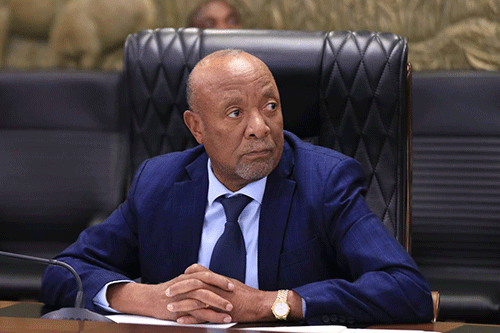While Namibia waits for Germany’s response to their July 2022 missive to relook the widely rejected tentative genocide agreement, Namibia yesterday revealed their initial N$1.1 trillion reparations demand still stands.
This position was revealed by deputy Bank of Namibia governor, Ebson Uanguta, who forms part of the Namibian negotiating team.
As things stand, Germany has only proffered projects worth 1.1 billion euros (N$18 billion) in seven identified regions as reparations for genocide.
Namibia’s N$1.1 trillion demand takes into account loss of life, dispossession of land and displacement among others.
It was informed by a study commissioned by government a few years ago.
“We came to an amount of 73 billion euros during that would translate to around N$1.1 trillion [exchange rate at the time]. I think for us, that definitely should be the amount,” Uanguta said.
Like in all negotiations, the Namibian side is cognizant that all its demands might not be met.
“The Germans have put only 1.1 billion euros [N$18 billion] on the table. And we asked for that higher amount [N$1.1 trillion]. So, we need to find a strategy on how we can break that stalemate,” said Uanguta.
The technocrat made these remarks at a press conference convened by Vice President Nangolo Mbumba to brief the public on the just-ended chief’s forum meeting.
He was responding to a question regarding the quantum Namibia deems appropriate for genocide reparations, following Rally for Democracy and Progress (RDP) leader Mike Kavekotora’s conservative N$13 trillion estimate.
“The human life is estimated at N$9 million. If you look at the land that was stolen by the Germans, that is prime land and its value is known. There is the loss of life. Around 100 000 Hereros and Namas were killed.
“Look at the opportunity cost. We could have been anything between 3.5 million and four million by now if you look at the population growth,” Kavekotora said in an interview recently.
On his part, Mbumba noted that they were now waiting for Germany to respond to their July letter.
“Hopefully, we will reach a figure which Germany is ready to give and which Namibia is ready to accept. The government of the Republic of Namibia is waiting for a response form Germany on the proposed addendum. I am assuring Namibians that no agreement has been reached or signed with Germany yet,” Mbumba said.
Mbumba also dismissed claims that the letter was sent under a veil of secrecy, saying there was no need to inform the public as there was nothing substantive contained in it.
In the contested communiqué, simply informed their counterpart that the draft joint declaration was received with mixed feelings by traditional leaders of affected communities and parliamentarians.
It states: “Germany must improve the quantum amount and/or give an assurance that the amount of 1.1 billion euro is not a final settlement and additional funding will be negotiated in the future. That there must be flexibility in the disbursement as we as front loading of funds in order to mitigate the problem of fluctuation and value for money during the 30-year period.”
Inclusivity
According to Mbumba, the chief’s forum – a body composed of government-aligned traditional leaders of the affected communities – resolved to include San and Damara communities in the genocide reparations battle.
“There was only one genocide in 1904-1908 that decimated communities of the Herero, Nama, Damara and San,” Mbumba said.
His sentiments reverberated through Freddy Nguvauva, a senior member of the Ovambanderu Traditional Authority.
“It was not only the Herero and Nama who perished during that period. So, the Damara people and the San were also affected. A large number of them were killed by the Germans,” Nguvauva, who was also in attendance at the media briefing, buttressed.
This is despite opposing arguments by certain quarters that the discussions only include Ovaherero and Nama communities as they were the only to targeted groups by general Lothar von Trotha’s extermination order of 2 October 1904.
To those traditional leaders who either feel left out or walked away from the negotiations table, Mbumba maintained that the door has always remained open for all.
“There was nobody who was not invited. Like any other difficult issue, people always thought they could go to court, use other methods or that they should be the leading negotiators, but whoever is negotiating is negotiating on behalf [of Namibians] and not their own name,” he said.
Void
More so, since the passing of the late Zedekia Ngavirue, who was Namibia’s special envoy on genocide talks, no appointment has been made to fill his void.
If Mbumba’s response yesterday is anything to go by, there is no appointment in sight.
According to him, the Namibian technical team will forge ahead without a special envoy as they square off eye-ball-to-ball with their German opponents, who are also without an envoy.
Caption: (Genocide)


